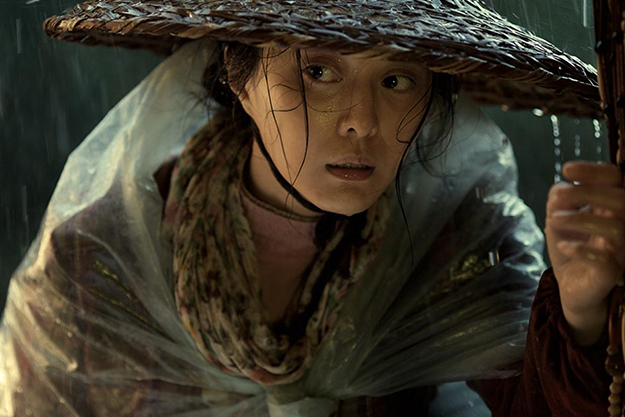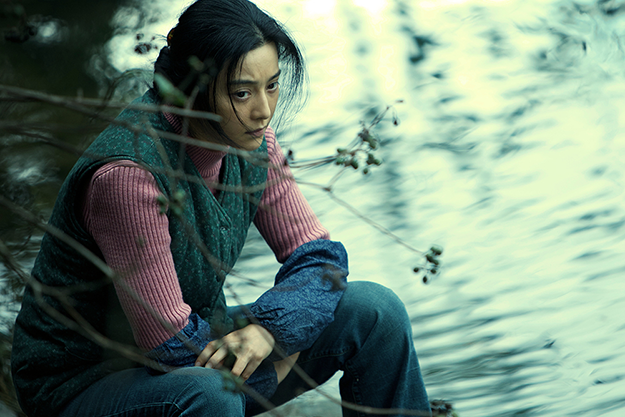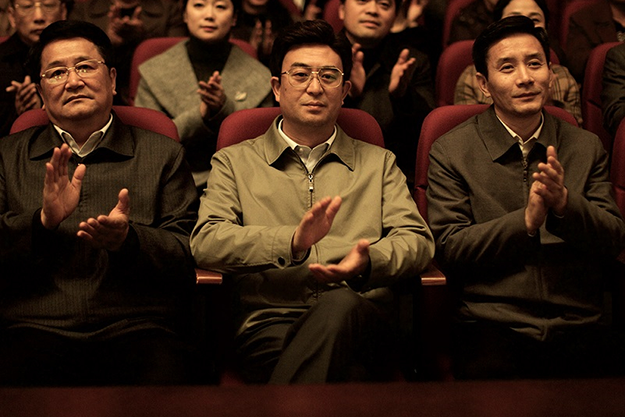Film of the Week: I Am Not Madame Bovary

There are a number of peculiar things about new Chinese film I Am Not Madame Bovary: not the least of them is the title. Flaubert’s 1856 novel Madame Bovary is about a woman in France who, bored with her marriage to a stolid doctor, embarks on three affairs, her head filled with misguided ideas of romance; the character of Emma Bovary, and the syndrome derived from her name, bovarysme, connote not just sexual appetite but a helpless, deluded inability to deal with life’s mundane realities. That’s certainly not the case with the heroine of Feng Xiaogang’s film, who is more than capable of looking reality in the face and taking steps to confront it.
In fact, the film’s Chinese title Wo Bu Shi Pan Jinlian refers to a legendary femme fatale named Pan Jinlian, identified in a brief opening sequence—a voiceover set to a series of antique illustrations—as an adulterous schemer from the Song Dynasty era. The woman played here by Fan Bingbing resents being thought of as a Pan Jinliang, and is clearly anything but; the film is about a woman struggling to refute the sexist libel that has been attached to her name. A snappier English title might have been I’m No Jezebel. Or perhaps Who, Me—Messalina?.
I Am Not Madame Bovary tells the somewhat convoluted story of the legal battles fought by a woman standing alone against a confederacy of male bureaucrats. Set largely around a small provincial town, the film—adapted by Liu Zhenyun from his own novel—is about a woman named Li Xuelian, or Lian (Fan). She’s first seen visiting a local judge, Wang. She wants a divorce, she says, although it appears she is divorced already—or at least, has a fake divorce. She and her husband Qin (Li Zonghan) had faked a divorce in order to get an apartment, planning to reunite and live there; but instead he has married another woman. If she doesn’t get the proper divorce she wants, Lian tells Wang, she’ll kill Qin. But if she does that, he warns her, she’ll never be able to get a divorce—a nice example of the perverse comic logic that starts the action off promisingly.

Then Wang does the dirty on Lian by declaring the divorce genuine and official, which is not how she wants it. Lian won’t be swayed—she starts accosting other officials higher up the chain, but gets nowhere with them, so asks her brother to help her help murder Qin. When he refuses, she offers the job to a beefy, clueless butcher in exchange for sexual favors; he’s keen until she reads out a litany of officials she wants murdered too.
Eventually Lian journeys to Beijing, where the annual National People’s Congress (NPC) is due to take place, to accost the higher-ups who really matter. A solemn senior official, Governor Zhu, tells the crowd that Lian has impressed him with her case; a whole chain of administrative officers are therefore for the chop. This would seem to settle things, but no: we now jump 10 years, and a new crowd of bureaucrats are still terrified of being sued by Lian, who has continued to travel annually to Beijing to lodge complaints. This year, she doesn’t intend to do it, following the tacit advice of no less a confidant than her cow. What she won’t do, however, is sign an agreement that she won’t sue again. That would stop her ever clearing her name, for the crux of the story is that her husband has publicly called her “Pan Jinlian”—a very big deal indeed, as the omniscient voiceover narration explicitly points out.
Running at 138 minutes, I Am Not Madame Bovary starts as taut satirical farce, then dissipates its effect by working over the same situation relentlessly and with wearying pedantry. There are endless stagy scenes of anxious male bureaucrats explaining their predicament at length, occasionally putting hands to faces in dumbfounded despair; at one point, two even collide in a doorway. Lian often seems marginalized in the action, and remains somewhat opaque.

The film’s second part, after the 10-year jump, follows an odd turn in Lian’s relationship with chef Zhao Datao (Guo Tao), a long-time admirer. He puts her up on her first visit to Beijing, accompanies her around a theme park featuring scale replicas of the White House and the Arc de Triomphe (the same one as in Jia Zhangke’s The World?) and generally proves a stand-up guy. Years later, he declares his passion but things get complicated—not least in an elegantly staged but troubling bedroom scene.
What happens, in an extended take, is that we intermittently see Zhao Datao roughly pawing Lian and undressing himself, the pair for the most part vanishing out of shot while the camera holds on a blue wall and a standard lamp; the room gradually grows dark before the camera tracks across the room to show Lian and Zhao lying in a post-coital embrace before a window offering a city panorama in shades of blue and green. Lian tells Zhao that what has happened is essentially rape, but adds, “It’s never been this good for me, ever”—an unsettling turn prefiguring the twist that follows.
But this moment is also characteristic of a certain excess of style in this film—an excess that some viewers may find extremely clever and polished, but that often feels like a merely decorative add-on. Nearly the whole film, in fact, is shot within tight, unusually shaped and proportioned frames—the image masked off either in a circle for the provincial scenes or in a square for Lian’s visits to Beijing, with the ratio only opening out to widescreen for the coda, and for one night shot where a bus crosses the screen.

All this makes the film, beautifully photographed as it is by Luo Pan, distractingly stylized. At first, the circular frames make sense: the “cameo” or “vignette” effect, first used for the opening illustrations of Pan Jinlian, gives the entire film the feel of a fable or a modern-day legend. The formal need to place all action at screen center supplies an artificial focus and cogency to scenes that might otherwise have come across as mundanely static. The round frame also highlights the exaggerated use of color, notably of turquoise aqueous tints and autumnal russets, making images seem like illustrations brought to life. The emphasis on symmetry and frontality also pays off in the odd sight gag: a sequence following Lian across a bridge ends with a neat zinger, as a man rushes back into frame to pick up a bag that’s been dropped exactly at screen center. This is the first Chinese film I’ve seen where there seems to be a discernible influence of Wes Anderson.
It’s hard to know quite how acutely pitched the film’s satirical irony is, but overall it feels heavy-handed. Box-office champion Feng (Dream Factory, Cell Phone, Personal Tailor), sometimes referred to as China’s Spielberg, has had problems with censorship in the past, but this film’s satire appears to tread a cautious line. While the comedy is directed at localized instances of administrative corruption, it never feels as if a larger system is targeted. Despite individual abuses, the law seems essentially benign, as does higher authority, like the governor who defends Lian. Towards the end, the status quo is restored as an official comment to a colleague: “Not looking after the people is the worst thing we can do for our superiors.”
The moral of Lian’s story, you might conclude, is that it is folly, harmful to oneself and to society, to persist in sticking to a deluded view; the coda, in fact, affirms that Lian’s fake divorce plan was misguided in the first place. Unless, perhaps, the return-to-order theme conceals an extra layer of satirical intent… Either way, the film’s sustained ironies feel increasingly laborious. Still, it’s easy to get stuck on what the film says about administrative abuses, and to overlook its central theme, which is a classic feminist one. This is a story about a woman resisting the conspiracy of men screwing her over and blackening her reputation. In an interesting speech, one of the officials argues that Lian is really three women, seen from different points of view: to the administration, a pest; to her husband, a slut; to herself, a righteous victim. And, the official concludes, “three difficult women combined is superhuman.”
But the film doesn’t give us much access to this living trinity of super-womanhood: Fan’s performance, largely playing up Lian’s quiet tenacity, is so downbeat that we never really get near her. Given the actress’s hyper-glamorous superstar image, her performance has a drabbing-it-down stunt quality that would be the Chinese equivalent to, say, Charlize Theron in Monster or Nicole Kidman in The Hours. Either way, it stops us really knowing Lian: she’s not Madame Bovary, but what she is remains deeply elusive, at least until the coda offers a different light on her. But 130-plus minutes is a long time to wait for a glimpse of what someone is, rather than what she’s not.
Jonathan Romney is a contributing editor to Film Comment and writes its Film of the Week column. He is a member of the London Film Critics Circle.







